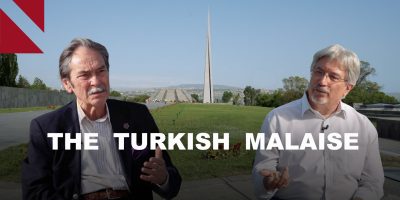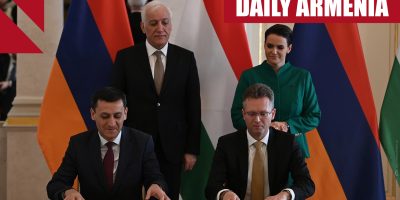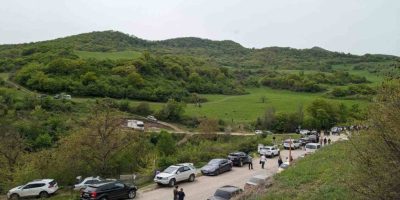Haidar Al-Sumedaae, Charge d’affaires of Iraq is finishing his diplomatic mission in Armenia. Mr. Al-Sumedaae spoke to CivilNet’s Harout Ekmanian about the liberation of Mosul, restoration of the area, as well as the growing Iraqi-Armenian political and economic relations.
– I would like to ask you first about the liberation of Mosul from ISIS and the continuing military operations, as well as the struggle on educational, cultural, and other grounds against ISIS. Could you please update us about what stage these operations are at?.
– These days, the people of Iraq celebrates the victory against ISIS, which is the most dangerous terrorist organization in the world. This terrorist organization stands against all religions and morality. Terror does not have a religion. The people of Iraq is fighting on behalf of all the peoples and countries of the world, against this destructive organization, which destroyed many parts in Iraq and killed so many Iraqis without making a distinction between their religion or ethnicity. They [ISIS] wanted to build their own state, based on a caliphate, but thanks God justice has prevailed and the Iraqi army won with the will and support of the Iraqi people. That is what we are celebrating these days. The problem of ISIS is now over in Iraq. We destroyed them. On July 10, the Prime Minister and the General command of the armed forces declared the end of military operations against ISIS. Now we are stepping into a new stage, and that is the reconstruction of Iraq. We wish we can start reconstruction very soon so that ISIS would never be able to come back to these liberated areas.
– What about the fight against ISIS on educational level. One might argue that this is more important than the military operations, which lasted for a year. What are your government’s plans to fight ISIS now on the educational front?
– Let me first mention that the International Coalition to fight ISIS played a big role in fighting ISIS and we are grateful to them for that. Our friends have helped us a lot. Now we are at a new stage that requires help from our friends and from the international coalition to reconstruct the destroyed areas, like Mosul, Ramadi, Salahuddin, Sinjar, and many other regions. It is also important to focus on the restoration and the rehabilitation of the society after ISIS has harmed them, for instance ISIS used children by recruiting them in their armed operations. Consequently, we are working on educational programs in cooperation with international organizations, such as the ICRC, UN, EU, and others. Currently, there are many offers to provide assistance to Iraq by our international partners, and we thank them all. We are also grateful to our brotherly nation of Armenia, which is very dear to us. Armenia helped Iraq a lot and extended her hand to help us many times. We thank Armenia for that.
– Can we conclude that the Iraqi government is working on the reconstruction and rehabilitation of cities and societies simultaneously?
– Exactly. Even when we were fighting ISIS, we had principles. For us, liberating a human being is more important than liberating territory. That is why the military operations took longer than they should have. Especially that ISIS used the civilian population as human shield everywhere. This was very dangerous. And fortunately we came out of it with the least possible casualties.
– When ISIS controlled large parts of Iraq all the people of Iraq suffered from their rule, but the Yezidis probably had a larger share of that suffering. The numbers of their victims and the kidnapped exceeded thousands and tens of thousands, the UN adopted resolutions condemning the genocide against Yezidis. Of course, there are also international condemnations against the killing of Christians and other minorities in Iraq, as well as the killings of Sunni and Shia Muslims without distinction. But the Yezidis were singled out, and the mass graves can testify about that. What does the Iraqi government do to repatriate Yezidis to their ancestral lands, to punish the criminals, and related processes?
– As I said, ISIS doesn’t have a religion. As they killed Yezidis, they have also killed Shias and Sunnis, without distinction. Iraqis of all sects and religions suffered, but since the Yezidis are smaller in number they [ISIS] tried to eliminate them. The Yezidis are a part of Iraq’s population, and they are our brothers. They are not isolated. Thus, the government is working first to bring them back to their recently liberated ancestral lands, because this is very important. The government rebuilds infrastructures, schools, markets, so that people can go back to their normal life. We are also working on many programs to support and rehabilitate them with the participation of our allies in the liberated areas so they can live there again.
– I assume there are also criminal investigations and the issue of the mass graves.
– Of course. There are Iraqi courts which are dealing with these issues. Many terrorists are of foreign nationalities, there are people from over 100 nationalities among ISIS. This is shocking. Iraq will work with other countries to prosecute them. There are certain procedures that are being arranged.
– What about the mass graves?
– The Iraqi government has recently started to exhume the remains of our martyrs who were victims of mass killings in many locations in Iraq. This is very important and urgent. Many families lost their children. Some families were completely annihilated. We are living very difficult days. But our government will cross this stage with the help of our friends.
IRAQ-ARMENIA RELATIONS
– As you mentioned about the friends and before that about Armenia’s role in reconstruction, could you also tell us more about the prospects of bilateral trade, agricultural cooperation, and weekly flights between Iraq and Armenia? What are the most interesting parts of this relationship? Where does its future lie?
– There are developments in the Armenian-Iraqi relations. Since the start of our mission in Armenia five years ago, the relations between two countries have developed due to efforts from both sides. During our stay here in Armenia we always witnessed the support of the Armenian government. We enjoy good relations. The Armenian side has always extended her hand to help Iraq In agriculture, trade, industry, political sphere. Economic relations are very important. We started direct flights 2-3 years ago, and we are working to make it permanent.
Tourism in Armenia is very popular as Armenia is beautiful, and nature here helps attract many tourists. Armenia has very good agricultural lands and its proximity to Iraq helps with the process of importing goods from here. The climate and type of seeds used in agriculture are also similar. All of these help to strengthen our bilateral relations. The two countries have signed agreements. During the last 3-4 years, there were delegations from both sides meeting occasionally. Every year the governments of Armenia and Iraq hold ministerial meetings, and we have formed a mutual cooperation council. In September of this year, there will be another set of meetings between Armenian and Iraqi ministries to sign new agreements and increase the level of cooperation. In fact, as we witness the willingness of Armenia to cooperate with Iraq, we actually speed up the process.
– What about trade relations?
– The size of imports and exports from Armenia is growing every year in large numbers. As of now, the volume of trade between the two countries is approximately 130 million USD annually. In the past six months, the increase was very noticeable. This shows the strength of our relations and that future prospects look good. I hope that the next bilateral ministerial meetings would raise the level of this cooperation and remove many barriers, which also requires efforts from both sides.
– As we know, Armenia also suffered from wars, massacres and genocide, and from those experiences Armenia could cooperate with Iraq to help the Iraqis recover from the effects of the war. This could be added to the already growing cooperation in trade, agricultural and political spheres. At the end of your mission here, what is your message from Iraq and the Iraqi people to Armenia?
– First of all, using this opportunity we extend our congratulations to the Iraqi people, especially to the Armenians of Iraq, who are an integral part of our nation, as well as to all our friends who helped Iraq, and Armenia is one of them of course. Armenia was a first in many categories. It supported us economically, politically, and in many other ways. I’d like to articulate our warm greetings to the dear Armenian people, who helps us in recovery and reconstruction. Armenia has a very good history and experience in reconstruction, agriculture, and many spheres. We wish this experience would be shared and developed further and yields good results for both Iraq and Armenia.
– We really wish that too. Thank you for the interview.
















